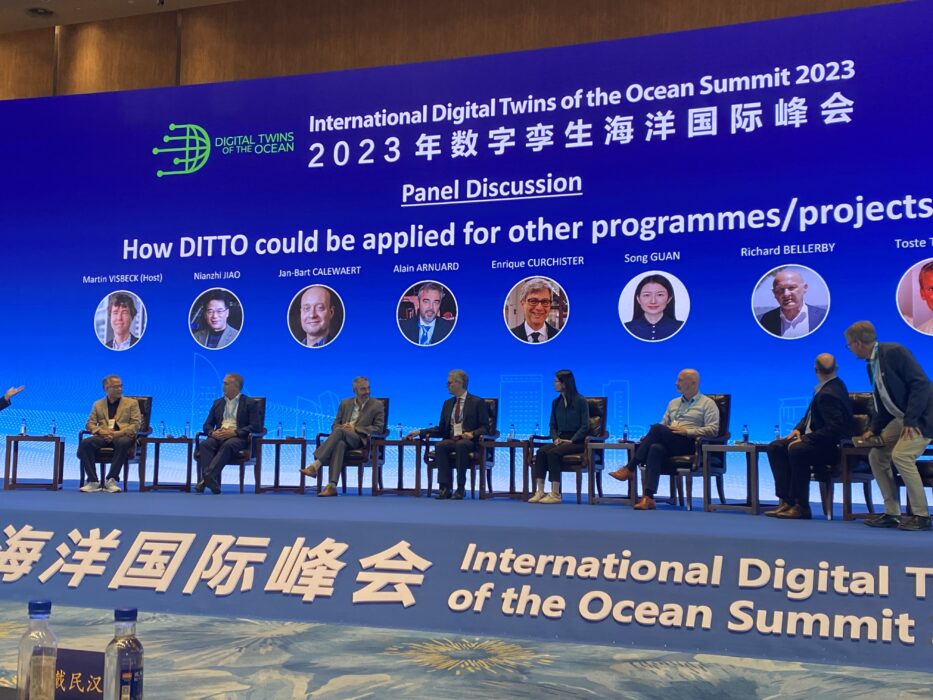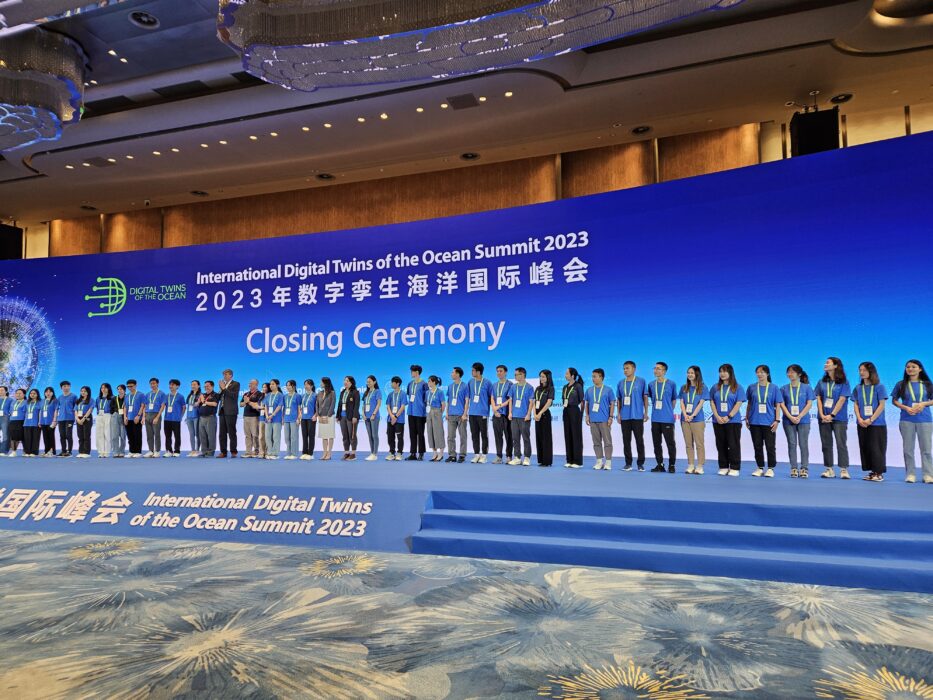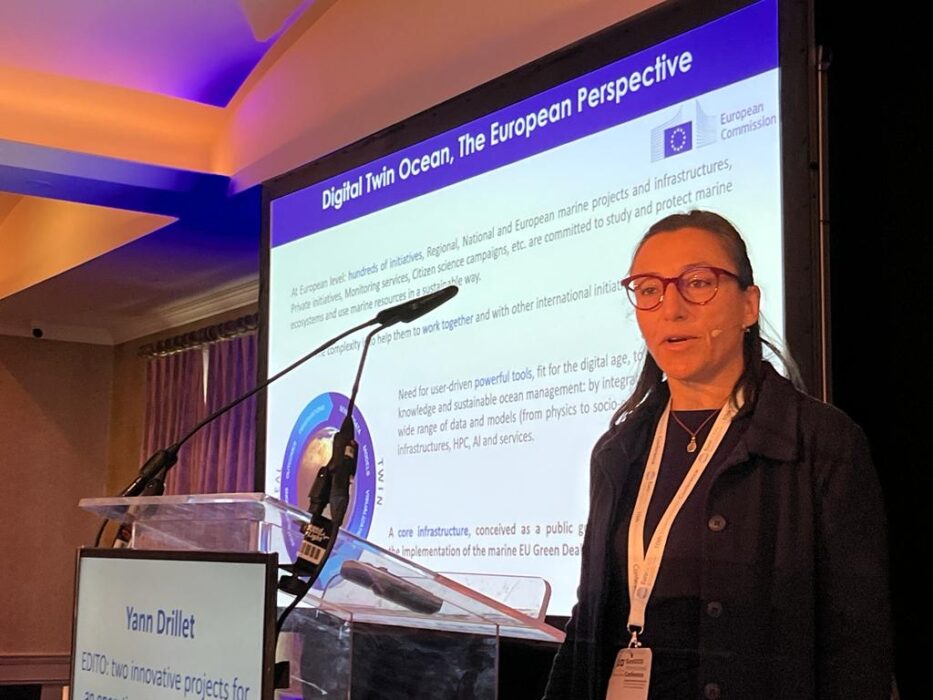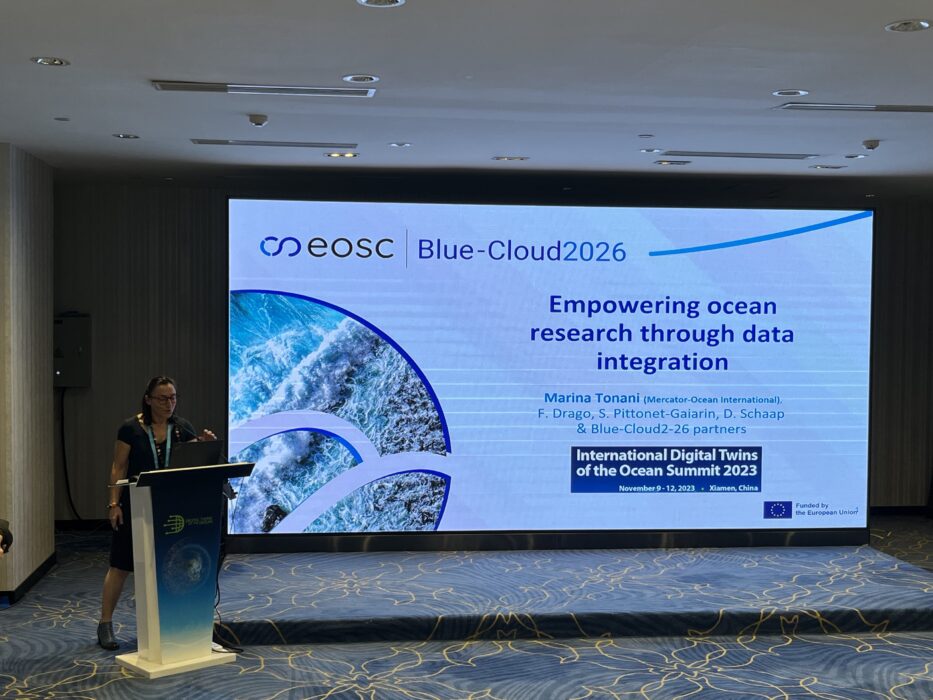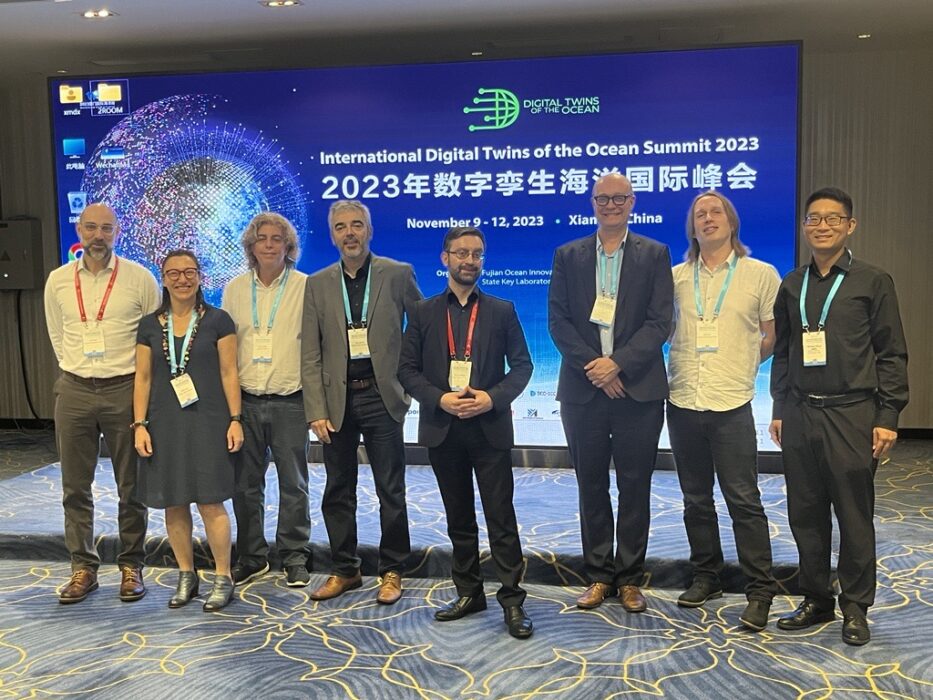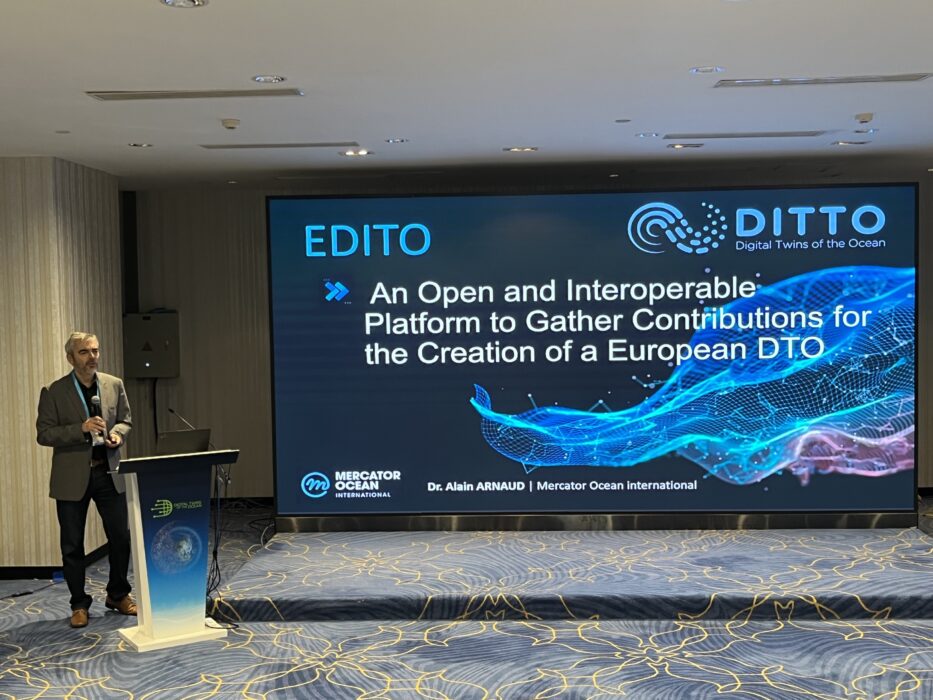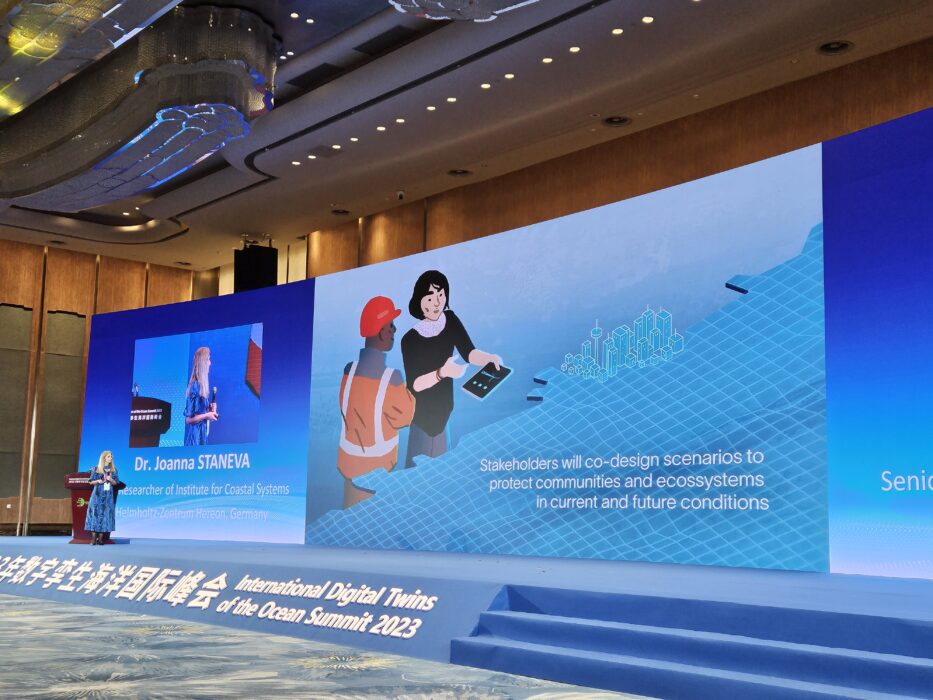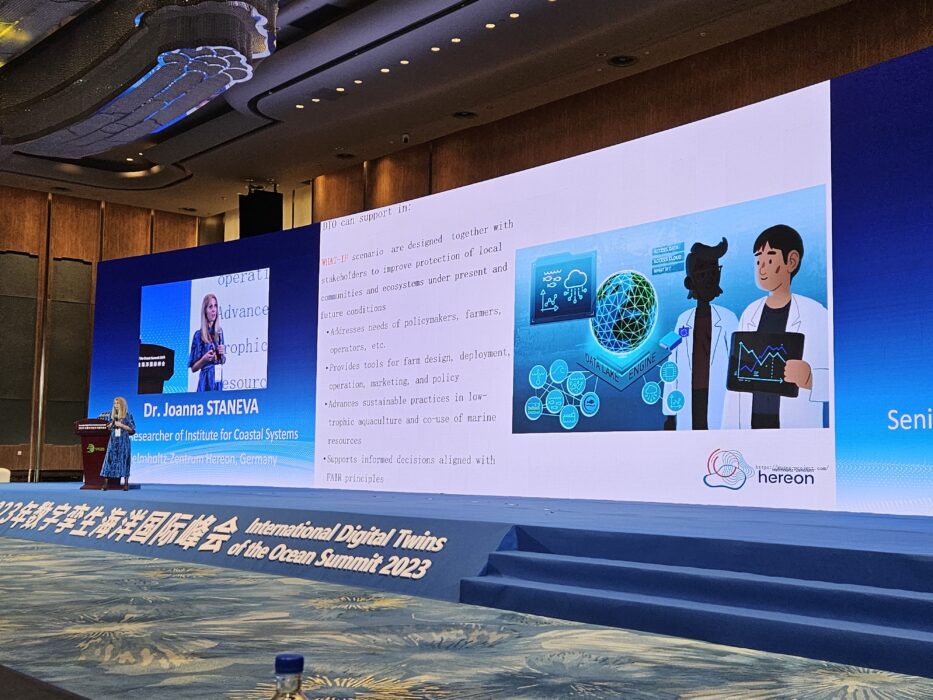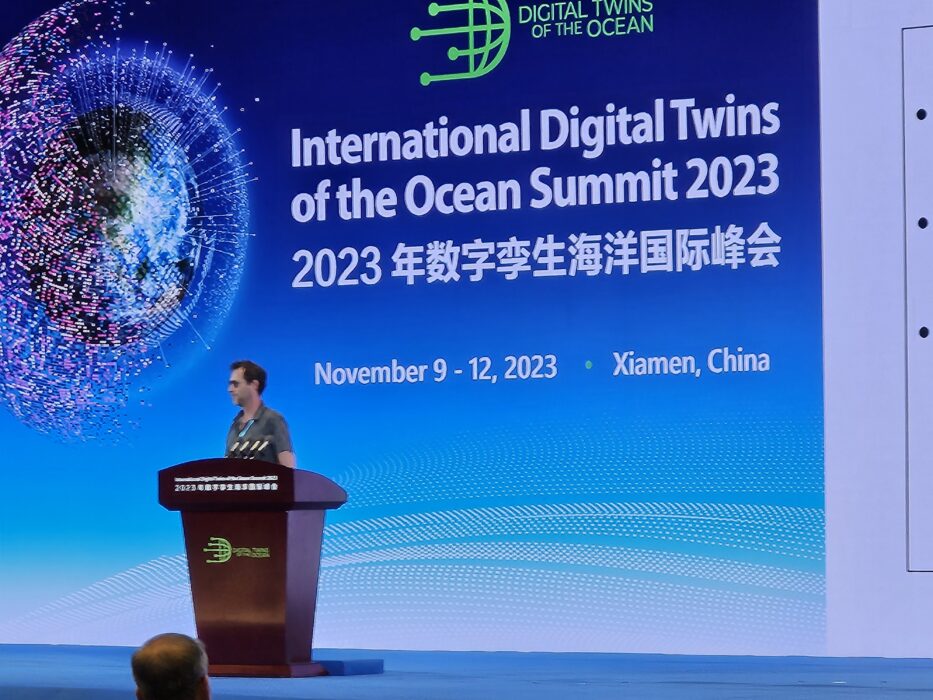Digital twins of the ocean will enhance our capacity to make informed operations, management and policy decisions that influence the processes and systems they mirror, enabling impactful communication that brings data to life. Through complex integration of data, models, analytics, and rules, digital twins resort to cutting-edge cloud services, supercomputing, artificial intelligence, made accessible through Human-Computer Interaction and visualisation interfaces.
The International Digital Twins of the Ocean (DITTO) Summit, held concurrently with the 2023 World Ocean Week from 9 to 12 November 2023 in Xiamen, China, brought together about 450 participants from 19 countries. The four-day Summit explored progress in the development of digital twins of the ocean around the world, including infrastructure requirements and how to ensure engagement of the young generation. Discussions also focused on emerging and potential applications such as marine ecosystem conservation, supporting a sustainable blue economy and safeguarding of communities in the face of climate change.
Initiated by the Ocean Decade Digital Twins of the Ocean (DITTO) programme, the summit, which debuted with a first edition in London in 2021, underscores a global commitment to cultivating a shared understanding and exchanging best practices in the development of DTOs. This commitment extends to enhancing the capabilities of digital twins to deepen our comprehension of the ocean and to establish robust and reliable, science-based decision systems.
The European Digital Twin of the Ocean an exemplary initiative on the global DTO landscape
Various sessions, keynote speeches and discussions during the Summit applauded the European Digital Twin of the Ocean (EU DTO) as an exemplary initiative making significant headway in the DTO realm. Launched in 2022 by the European Commission, the EU DTO initiative is well underway, with Mercator Ocean International (MOi) at the forefront of its construction, federating Europe’s ocean observing and prediction community and exploring the frontiers of science, technology and other resources. Together with the Flanders Marine Institute (VLIZ), MOi is building the EU DTO’s core operational infrastructure through the EDITO-Infra project (EU Public Infrastructure for the European DIgital Twin Ocean). The project will build platform comprising a data lake, processing engine and a virtual simulation environment, cloud and high-performance computing (HPC) services, tutorials and more. In the pursuit of constructing a virtual simulation environment, MOi is spearheading the 13-partner consortium of the EDITO-Model Lab project (EDITO-Model Lab Underlying models for the European DIgital Twin Ocean). This project is building the next generation of models, software and tools to be seamlessly integrated into the EDITO-Infra platform and enable on-demand simulations and exploration of various what-if scenarios to test and assess impacts of management decisions and potential impacts of climate change on marine and coastal environments. Aiming for an operational demonstration of capabilities by 2024, these two interdependent projects provide the foundation for a thriving digital ecosystem, laying a strong foundation for further development of the EU DTO and hosting the deployment of multiple digital twin ocean applications.
Mercator Ocean and EU DTO at heart of discussions on DTO design and architecture
The session on DTO architecture and interoperability explored interoperability methods, integrative data management and architecture frameworks that could be applied as the fundamental basis for reusable twins and twin components. Interoperability is an underlying requirement of digital twins to be able to deploy different applications and integrate data from new sources. Alain Arnaud (head of the Digital Ocean Department at MOi) presented EDITO-Infra and its endeavour to build an open and interoperable platform, gathering contributions from the EU community to create a dynamic EU DTO ecosystem. Interoperability at the heart of its design, the EDITO-Infra architecture not only facilitates the exploration of existing data and computational processes on the DTO platform, but also allow users to integrate their own data, processes and services into the platform. This framework also enables users to build and share third party services, fostering the deployment of multiple DTO applications from ongoing and future twinning projects. Marina Tonani (Monitoring and Forecasting System Architect at MOi) – a consortium partner of Blue-Cloud 2026) illustrated the EU DTO’s ambition to integrate the contribution of different projects by highlighting the EU project Blue-Cloud 2026 and how it will feed into the EU DTO’s architecture and the implications for advancing ocean research through open science and data.
During the session on DTO and data lakes, Alain Arnaud presented the EDITO-Infra data lake and the EU DTO’s aim to federate digital twin of the ocean initiatives. The data lake will be fed by openly accessible marine (and related) datasets, to start with from the EU’s Copernicus Marine Service and European Marine Observation and Data Network (EMODnet). Once completed, the data lake will enable a single-entry point to openly access the widest possible range of in situ and remote marine observation datasets, and model derived products, as well as hosting for new sources of data.
In another pivotal session entitled, “Ocean Modelling and Coupled Systems”, Yann Drillet (Head of the Operational Oceanography Department at MOi) showcased the EDITO-Model Lab project. This initiative is building an innovative suite of ocean models, incorporating sophisticated elements such as new modelling and simulation software, artificial intelligence (AI), algorithms, and specialised tools. This will provide the EU DTO with unique service capacity for accessing, manipulating, analysing, understanding marine information, with enhanced ocean forecasting and ocean climate prediction capabilities.
Enrique Alvarez (Coordinator of the UN Decade Coordination Centre for Ocean Prediction, hosted by MOi) co-chaired the session on “Data Analytics and Model Prediction Engines”. Presentations investigated the development of tailored data analytics and predictive capabilities based on machine learning and AI. These functionalities make up the backbone of the DTO, allowing for the development of model-based simulations for understanding and predicting the short- and long-term evolution of Essential Ocean Variables, among many others, at global, regional, and local scales, and data assimilation solutions for improving performance of integrated modelling systems.
Reflections from the Summit and future outlook
With the foundational infrastructure of the EU DTO well under construction, the DITTO Summit offered a global forum to exchange insights and showcase progress in a swiftly evolving digital era of ocean science. In anticipation of 2024, notably the upcoming 2024 Ocean Decade Conference and the third edition of the EU Digital Ocean Forum, the MOi team looks forward to yet another dynamic year, marked by substantial progress. The culmination of these efforts is expected to be operational demonstration of the EDITO platform before the end of 2024, representing an exceptional milestone in the journey toward using ocean science and innovation for sustainable development and a healthier planet.
Useful Links
- DITTO Summit 2023: https://ditto-summit2023.scimeeting.cn/en/web/index/
- Digital Ocean Forum 2024: Call for early applications: https://edito-infra.eu/call-for-applications-to-contribute-to-the-european-digital-twin-ocean/
- European Digital Twin of the Ocean: https://research-and-innovation.ec.europa.eu/funding/funding-opportunities/funding-programmes-and-open-calls/horizon-europe/eu-missions-horizon-europe/restore-our-ocean-and-waters/european-digital-twin-ocean-european-dto_en
- Mercator Ocean International and the Digital Twin Ocean: https://www.mercator-ocean.eu/en/digital-twin-ocean/
- EDITO-Infra (EU Public Infrastructure for the European DIgital Twin Ocean) https://edito-infra.eu/
- EDITO-Model Lab (Underlying models for the European DIgital Twin Ocean) https://edito-modellab.eu/
- Blue-Cloud 2026: https://blue-cloud.org/
- DITTO Ocean Decade Programme: https://ditto-oceandecade.org/

